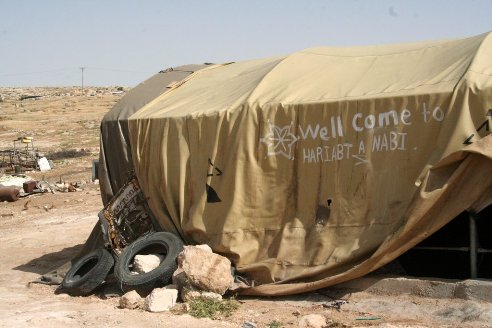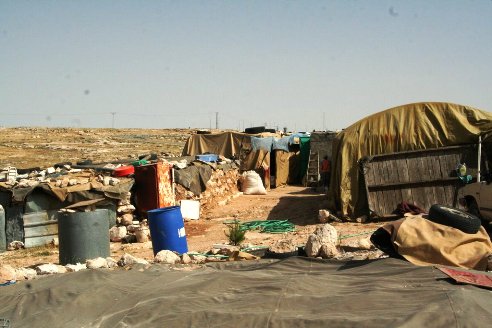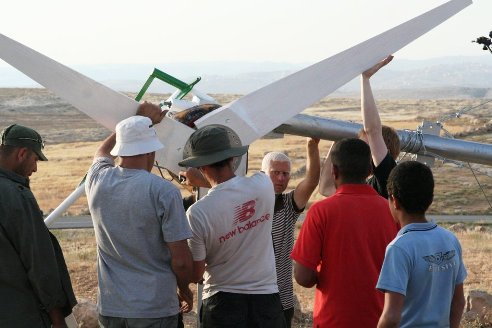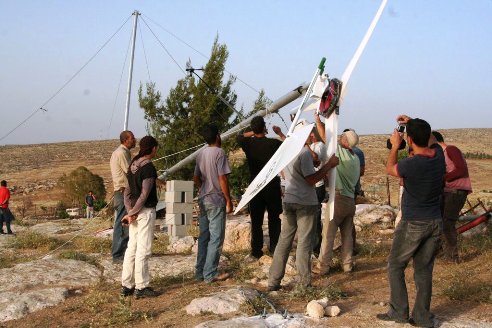South Hebron Mountain is the poorest region in the West Bank. The Palestinians here are mostly peasants who live in small villages, and get by selling butter and yogurt cheese, which they produce from their goats' milk.
The village of Hariabt A Nabi is home to seven families, who claim to have been living on this piece of land for over 200 years. The elders of this village experienced the British Mandate until 1946, were part of Jordan for more than two decades (1946-1967), and have been under Israeli control during the past 43 years.
Israel considers this village an illegal settlement. The locals have been asked to evacuate their homes and move into neighboring city Yatta.
A few times -- with the last being ten years ago -- the Israeli military came in with a bulldozer and tore down the entire village. But the villagers refused to give up their land and have repeatedly rebuilt their modest homes.
Being an illegal settlement, according to the Israeli authorities, is the reason Hariabt A Nabi has remained unconnected to the electricity grid. The power line -- which leads electricity to neighboring Jewish settlements -- goes above the village.
Family Home in Hariabt A Nabi
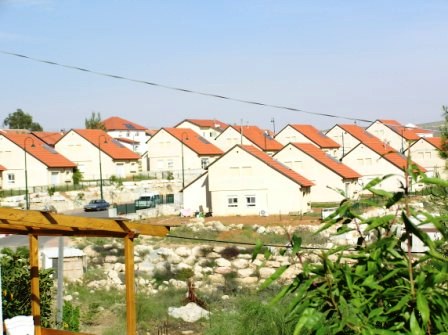
But one weekend in May, made the lives of the locals in Hariabt A Nabi much easier.
A rare positive interaction with Israelis has brought light to the village, and given hope that maybe, after all, co-existence in the Holy Land is possible.
See how it happened in the video report below, which I recently prepared for VJM.
The Comet-Me team (Community, Energy and Technology in the Middle East) is doing what only few other Israelis do. They communicate directly with Palestinians.
Their renewable energy systems have already brought electricity to eight off-grid Palestinian villages. The construction of the solar panels and wind turbines is always done together with the local Palestinian residents.
Another contributor to the building of the renewable energy system in Hariabt A Nabi was the N.G.O. Engineers without Borders Palestine. While the negotiations between the Palestinian and Israeli governments seem to be going nowhere, at least N.G.O.'s from both sides have not given up and are cooperating to improve the situation.
West Bank Update
The villagers living in South Hebron Hills are very poor, but on my way to Hariabt A Nabi (and to Ramallah for another report) I saw a lot of new buildings and Palestinian neighborhoods being built. Advertisement billboards have popped up on the sides of the roads, and there was a surprisingly large amount of expensive looking cars bearing Palestinian license plates. Many of the IDF's checkpoints and roadblocks disappeared, and the traffic was quite busy.
The impression I got was that even though the IDF's presence is still very much felt, there is today much more freedom for economical development in the West Bank than there was a half a decade ago. Let's hope the killing of an Israeli police officer this week, will not lead to another round of violence in the region.
Palestinian Prime Minister Salam Fayyad denounced the killing, calling it a disgraceful act that hurts Palestinian interests. Much was written about the new kind of leadership Prime Minister Fayyad has brought to the Palestinians (Newsweek, NY Times). His policy is building the Palestinian state and economy regardless of the negotiations with Israel, and the results are clearly evident while driving through the West Bank.
Despite all the international pressure and help, reaching peace in Israel and Palestine is up to the three governments that rule the region; Fayyad Fatah's government, Ismail Haniya's Hamas government in Gaza, and Benjamin Netanyahu's Israeli government. At least for now, it seems Fayyad is the only leader out of the three, that is contributing to the region being more peaceful.
Links:
•Israelis show the light to Palestinian herders, IPS, 01.11.2009
•A few good man, The Guardian, 08.07.2008
•Salam Fayyad BBC Profile, 17.06.2007

